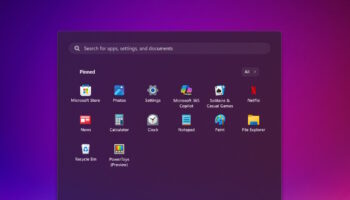97 percent don't recognize the security limitations of containers

A new study finds that only three percent of respondents recognize that a container, in and of itself, is not a security boundary, suggesting that the default security capabilities of containers are overestimated.
The survey, from cloud security company Aqua Security of 150 cloud native security practitioners and executives from IT, Security and DevOps teams, across sectors and geographies, also shows that only 24 percent of respondents have plans in place to deploy the necessary building blocks for runtime security.
Satechi launches trio of USB-C GaN chargers

USB Type-C is amazing. This reversible USB connector is not just used for data connections, but power too. For instance, there are many laptops, tablets, and smartphones that charge using USB-C. When all of your devices use USB-C, it makes your life much easier -- there are fewer wires and chargers to deal with. Even better, you can potentially travel lighter by packing less. Hopefully Apple will eventually bring USB-C to the iPhone fully -- the company already has with some iPad models.
Today, Satechi launches a trio of USB-C chargers, and since they are of the GaN variety, they are very compact. While all three are similar, they are also quite distinct. All three have foldable prongs which makes them ideal for travel, but the number of ports and wattage varies. The 66W and 108W models both have three ports, but the 100W variant has only one.
Get 'Deep Learning for Beginners' ($27.99 value) FREE for a limited time

With information on the web exponentially increasing, it has become more difficult than ever to navigate through everything to find reliable content that will help you get started with deep learning.
This book is designed to help you if you're a beginner looking to work on deep learning and build deep learning models from scratch, and you already have the basic mathematical and programming knowledge required to get started.
Over half of exploits sold on underground forums are for Microsoft products

A new study from Atlas VPN shows that 51 percent of exploits sold on underground cybercriminal forums are for Microsoft products.
Microsoft Office exploits make up 23 percent while Windows accounts for 12 percent of exploits sold on hacker forums. Remote Desktop Protocol (RDP) exploits make up 10 percent, with Internet Explorer and Share Point taking three percent each.
Google is rolling out its unified backup service, Backup by Google One

Backing up Android data is getting a whole lot easier as Google starts the roll out of Backup by Google One. The service makes it easy to backup everything from SMS, MMS and call logs, to Wi-Fi passwords and photos.
The company has not made a great deal about the rollout, making no announcement about it. This is perhaps understandable as it is essentially a consolidation and rebranding of a previously disparate selection of settings and tools.
Stability is key to success of mobile apps

Stability is key to the success of mobile apps according to a new report from Bugsnag which shows that a drop of just one percent in stability can lead to a loss of a star in app store ratings.
Users rate apps on the Google Play and Apple App Stores based on their overall experience with factors like usefulness, design, engagement and stability. While the median stability across analyzed apps within the report is 99.8 percent, more stable apps are found to have a competitive advantage, resulting in higher ratings.
Twitter is experimenting with a downvote option on tweets... but don't call it a Dislike button

Twitter is experimenting with tweaking the Like button on tweets. In a test the company is running at the moment, some users are seeing Upvote and Downvote options in place of the more familiar heart icon for liking a tweet.
Different styles of button are currently being tested, but it seems that the experiment is more for the benefit of Twitter than Twitter users. The experimental feature is not the tweet editing option so many people have been begging for for so long, and nor is it -- Twitter is at pains to emphasize -- a "dislike" button.
Unlocking digital transformation with Robotic Process Automation (RPA)

The term "digital transformation" has become synonymous with a company’s endeavor to modernize. It allows organizations to transform their operating models to improve customer experience, increase successful outcomes, and gain a competitive advantage in the marketplace. While many technologies, processes, and cultural adjustments are needed to drive digital transformation successfully, "automation" is a critical aspect of the entire process.
Robotic Process Automation (RPA), with its capability to digitalize several operations and processes, has a great potential to accelerate digital transformation for an enterprise.
The rise of home tech security

Technological advances have a significant trickle-down effect, intended to improve all aspects of modern living. This is especially true in the home, where the "smart" revolution has filled our homes with all sorts of automated and interconnected devices.
It’s estimated that the home automation market will hit 350 million users by 2023. This includes security measures as well, and the past few years have shown a proliferation of new and improved devices to keep our homes safe. We’ll take a look at some of these security solutions and how home-owners can harness new tech to protect themselves and their families.
Researchers discover high-severity, 16-year-old flaw in drivers for millions of HP, Samsung and Xerox printers

Security researchers from SentinelOne have uncovered an ancient vulnerability in the drivers used by printers from three big manufacturers.
The high-severity security vulnerability -- which is being tracked as CVE-2021-3438 -- affects drivers for HP, Samsung and Xerox printers and has evaded detected for 16 years. In all, around 400 printer models are at risk, leaving millions of printers exposed to the danger of the serious privilege escalation vulnerability.
Culture not tech is a barrier to DevOps success

While 83 percent of IT decision makers say their organizations are implementing DevOps practices, many have stalled at a mid-stage of evolution.
A report from infrastructure automation company Puppet shows that it isn't technology but rather cultural blockers which remain the biggest hurdle to reaching DevOps maturity.
Sequoia: Linux kernel security flaw gives unprivileged users root access

A vulnerability has been discovered in the Linux kernel that makes it possible to gain root access on a number of popular distributions, including Ubuntu, Debian and Fedora. The flaw has been named Sequoia, and it exists in the filesystem layer.
The security issue is thought to affect all versions of the Linux kernel released since 2014, meaning that a large number of distros are vulnerable. Specifically, the flaw is a size_t-to-int type conversion vulnerability that can be exploited to elevate privileges.
False flags and internet censorship: A cautionary tale

The Internet went down in Mauritius -- and you should be afraid.
Homes, businesses, and even mobile/wireless users were unable to access much of the online world on Monday thanks to what government IT managers are calling an "external cyberattack from multiple locations."
Critical vulnerabilities found in cloud-based ICS management systems

There are lots of good reasons for moving industrial control systems to the cloud including better telemetry and analysis of device performance, management of logic and remote device configuration, improved diagnostics and troubleshooting, a centralized view of processes.
But as more operational technology and lCS make the move, they become increasingly vulnerable to threats. ICS security specialist Claroty has unveiled its new Team82 research arm along with a report on critical vulnerabilities found in cloud-based management platforms for ICS.
6 reasons why your website is slow and how to fix it

In 2021, site speed optimization is a must if you want to build a successful online business. The reason is that site speed affects SEO, user experience, bounce rates, and -- most importantly -- conversion rates.
However, a recent study suggests that the average time it takes to fully load a webpage is 10.3 seconds on desktop and 27.3 seconds on mobile. In other words, website owners are still struggling to optimize their sites’ pages. And in the following paragraphs, we will look at some of the most common issues that can slow a website down. Additionally, we’ll share solutions that every site owner can benefit from.
© 1998-2025 BetaNews, Inc. All Rights Reserved. About Us - Privacy Policy - Cookie Policy - Sitemap.




